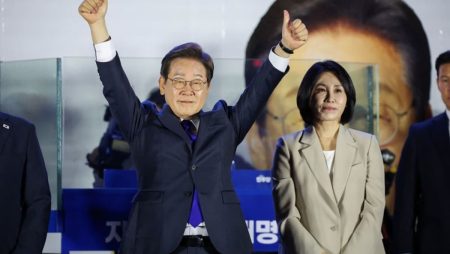The recent developments surrounding the impeachment motion against South Korean President Yoon Suk-yeol have captured significant attention and created a wave of political uncertainty in the country. The motion was brought to a plenary session that commenced shortly after midnight on a Thursday, setting the stage for a voting process anticipated to take place within 24 to 72 hours. The urgency of this situation highlights the gravity of Yoon’s presidency and the increasing discontent among opposition parties that are pushing for his removal. This impeachment motion marks a critical moment in South Korea’s political landscape, indicating a serious rift between the government and its challengers.
For the impeachment motion to be successful, opposition parties must secure a two-thirds majority vote, necessitating approximately 200 votes in favor. This is a considerable feat, as it requires not only unity among opposition members but also the defection of around eight members from Yoon’s own party. Such a scenario illustrates the complex dynamics within South Korea’s political parties, where alliances and defections can significantly shift the balance of power. The requirement for bipartisan support underscores how deeply polarized South Korean politics have become, with the current administration facing disbelief from its opponents regarding its governance.
Should the impeachment bill receive the necessary support and be approved by the National Assembly, the matter would then proceed to the Constitutional Court. Their role would be to evaluate and ultimately uphold or overturn the impeachment motion, a process that can be lengthy and may take up to 180 days. This timeframe could prolong political instability in the country, as ongoing deliberations would leave a cloud of uncertainty over the executive branch’s functionality. Meanwhile, Yoon’s administration remains in a precarious position, where each development related to the impeachment could sway public opinion and affect the Court’s final decision.
In the event the motion passes, and Yoon finds himself suspended from his presidential duties, the reins of leadership would temporarily fall to Prime Minister Han Duck-soo. This transition would further complicate the political landscape, as Han would have to navigate the challenges of governing during a turbulent period. The public might perceive this shift as a stopgap measure rather than a genuine resolution to the governance crisis, which could lead to increased calls for clarity and stability in leadership. The prime minister’s actions and decisions during this interim period would be under close scrutiny and could impact both his standing and the overall political equilibrium.
The implications of Yoon’s potential resignation or removal from office are significant, as they would trigger a new presidential election to be held within the next 60 days. The prospect of a sudden election introduces another layer of unpredictability, as various political factions would scramble to position their candidates and platforms to appeal to the electorate. This scenario also suggests that the public’s sentiment towards Yoon’s presidency could dramatically influence the outcomes, particularly if dissatisfaction remains high among citizens. The possibility of a swift election would energize political engagement but could also exacerbate divisions among the parties.
Overall, the looming impeachment vote represents not just a pivotal moment for President Yoon, but also a broader reflection of the currents running through South Korean politics today. With significant implications for governance, party dynamics, and public engagement, the context surrounding the impeachment motion highlights the delicate balance of power in the nation’s political framework. As the situation continues to unfold, both the immediate and long-term consequences of these political developments will likely resonate throughout South Korea and shape the country’s future trajectory.










